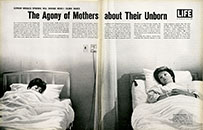
German measles epidemic will damage nearly 20,000 babies
The Agony of Mothers about Their Unborn
Life Vol. 58, No. 22 June 4, 1965
In a California hospital two women contemplated minor but fateful surgery. One closed her eyes tightly; the other just stared. Both were expectant mothers, and because they had caught German measles, they had decided to give up their unborn children. This common childhood disease has been raging as a little-publicized epidemic for more than a year, and by the time it runs its course nearly 20,000 defective babies will have been born in this country to women infected during early pregnancy. Fearful of the almost 50-50 change that their babies had already been severely damaged, these two women underwent therapeutic abortions.
The operations were performed by conscientious doctors of the highest integrity who acted in defiance of community convention and state law. Like most states, California permits such operations only when pregnancy endangers the mother's life, and many religious groups oppose abortions under any circumstances. But the virulence of this epidemic—many defective babies have already been born (see p. 31)—has prompted hundreds of technically illegal abortions in U.S. hospitals in the past year.
German measles is a cyclical virus disease. This particularly vicious epidemic hit the East in early 1964, then the Midwest and South. Having waned in those areas, it hit the West Coast and Hawaii hard only last month. For millions of men and small children, it meant little more than a rash and a sore throat. But for pregnant women who have not had German measles, the dangers are insidious and subtle. Some women have a "silent infection" which does mot manifest itself in the usual symptoms. Others confuse the disease with ordinary measles and mistakenly think they are immune.
Evaluating the evidence, doctors have concluded that German measles is a far worse pregnancy menace than they had realized. Like thalidomide (Life, Aug. 10, 1962), it is most dangerous in early pregnancy. Unlike thalidomide, it does not deform unborn children. But it can cause mental retardation, heart defects, blindness, deafness, disease of the bone and blood abnormalities. As many as five defects have been detected in one child.
Awaiting Surgery. In their room at a university hospital in California, Mrs. William Stonebreaker (left) and another woman face the long night before their abortions. Both were urged by physicians to have the operation.






